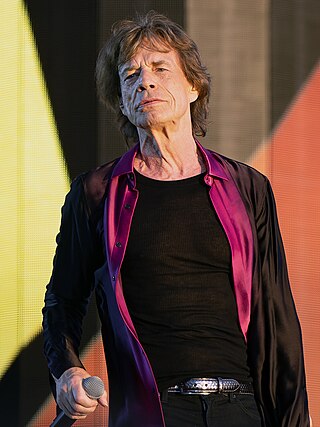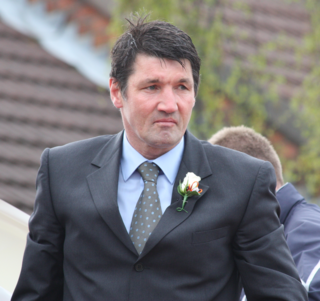Related Research Articles

Sir Michael Philip Jagger is an English musician. He is best known as the lead singer and one of the founder members of the Rolling Stones. Jagger has co-written most of the band's songs with lead guitarist Keith Richards; their songwriting partnership is one of the most successful in rock music history. His career has spanned over six decades, and he has been widely described as one of the most popular and influential front men in the history of rock music. His distinctive voice and energetic live performances, along with Richards' guitar style, have been the Rolling Stones' trademark throughout the band's career. Early in his career, Jagger gained notoriety for his romantic involvements and illicit drug use, and has often been portrayed as a countercultural figure.

Lewis Brian Hopkin Jones was an English musician and founder of the Rolling Stones. Initially a slide guitarist, he went on to sing backing vocals and played a wide variety of instruments on Rolling Stones recordings and in concerts.
Mick Jones may refer to:
Michael Jackson (1958–2009) was an American singer, songwriter and dancer known as the "King of Pop".
Mick is a masculine given name or nickname, usually a short form (hypocorism) of Michael. Because of its popularity in Ireland, it is often used in England, the United Kingdom in general, English-speaking North America, and Australia as a derogatory term or ethnic slur for an Irish person or a person of Irish descent, particularly ethnic Irish Catholics. In Australia, the meaning also broadened to include any Roman Catholic. A colloquial but possibly false etymology also attributes the origin of the anti-Irish slur to the prevalence of Irish surnames containing the patronymic prefix "Mc-" ; whether this patronym significantly contributed to the development of the ethnic slur is debated, but the prevalence of the first name or nickname "Mick" among Irish people is considered by etymologists to be the primary origin of the slur.

Foreigner is a British-American rock band formed in New York City in 1976 by guitarist Mick Jones, vocalist Lou Gramm, drummer Dennis Elliott, keyboardist Al Greenwood, bassist Ed Gagliardi and multi-instrumentalist Ian McDonald, the last of whom was also a founding member of King Crimson. Foreigner is one of the world's best-selling bands of all time, with worldwide sales of more than 80 million records, including 37.5 million in the US.
Michael David Jones is an English former footballer who played as centre forward with Leeds United during the 1960s and 1970s. He was also capped for England.

Michael Leslie Jones is an English musician, songwriter and record producer, best known as the founder and leader of the British-American rock band Foreigner. Prior to Foreigner, he was in the band Spooky Tooth.

Michael Gordon Harford is an English football manager and former professional player. He is the chief recruitment officer at Luton Town, a club where he has spent a large portion of both his playing and non-playing career. In addition to two separate spells as a player at Luton, including as part of the team that won the League Cup in 1988, Harford has been the club's director of football, first-team coach and manager; the latter role saw him lead Luton to victory in the Football League Trophy in 2009 and win League One in a separate spell in 2018–19.

"English Civil War" is a song by English punk rock band the Clash, featured on their second album Give 'Em Enough Rope, and released as a single on 23 February 1979. It reached number 25 in the UK Singles Chart and number 29 in the Irish Singles Chart.

The 1972 FA Cup final took place on 6 May 1972 at Wembley Stadium. It was the centenary final and the 44th to be played at Wembley.

"The Call Up" is a song by English punk rock group the Clash. It was released as the first single from the band's fourth album, Sandinista!. The single was released in November 1980, in advance of the release of Sandinista!, with "Stop the World" as its B-side.
"I (Who Have Nothing)" (sometimes billed as "I Who Have Nothing") is an English language cover of the Italian song "Uno dei Tanti" (English: "One of Many"), with music by Carlo Donida and lyrics by Giulio "Mogol" Rapetti. The initial version, "Uno dei Tanti", was performed by Joe Sentieri in 1961. The song first recorded in English by Ben E. King in 1963 with new lyrics by Jerry Leiber and Mike Stoller.
Mick Butler is an English former professional footballer who made 350 appearances in the Football League playing as a striker for Barnsley, Huddersfield Town, AFC Bournemouth and Bury during the 1970s and 1980s.
Michael or Mike Jones may refer to:
"Groovy Times" is a song by the Clash, featured on their The Cost of Living EP, and released as a promotional single in 1979 in Australia by Epic Records, and also included with initial pressings of the US release of the band's debut album. It was originally recorded as "Groovy Times Are Here Again" during the recording sessions for Give 'Em Enough Rope, however this demo has never been officially released, but can be found on many Clash bootlegs. It was never performed live.

Michael Jones was an English professional footballer and coach.

Graeme Anthony Jones is an English professional football manager and former player who works as the joint assistant at Newcastle United along with Jason Tindall.
The RFU Knockout Cup was an English rugby union competition open to any member of the Rugby Football Union. First contested in 1971, it was the premier competition in English club rugby before the establishment of the English league structure in 1987.
References
- 1 2 3 Mick Jones at the English National Football Archive (subscription required)
- ↑ "Mick Jones". Barry Hugman's Footballers.
